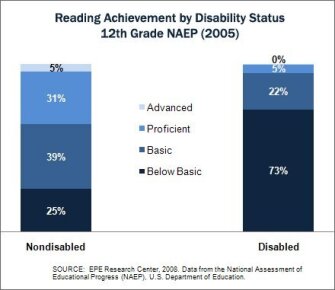Since the passage of the No Child Left Behind Act in 2002, researchers, policy makers, and educators have devoted increased attention to academic achievement of students with disabilities. While various studies have shown that students with different learning disabilities have benefitted academically from curricula and teaching methods tailored to meet their needs, most research finds significant achievement gaps between disabled and nondisabled students.
A recent study by the EPE Research Center, Special Education in America, used the National Assessment of Educational Progress (NAEP) to compare the reading performance of 12th graders with and without disabilities. While five percent of disabled students scored at or above proficiency, 36 percent of nondisabled students attained the same measure of achievement, a gap of 31 percentage points. The majority of disabled students (73 percent) tested below the basic level on NAEP. Other research examined in the center’s report, however, finds that the levels of academic proficiency vary greatly within the special education population. Notably, a student’s particular disability diagnosis (e.g., hearing impairment versus mental retardation) consistently emerges as strong predictor of achievement.
For more state-by-state data on special education and other topics, search the EPE Research Center’s Education Counts database.


